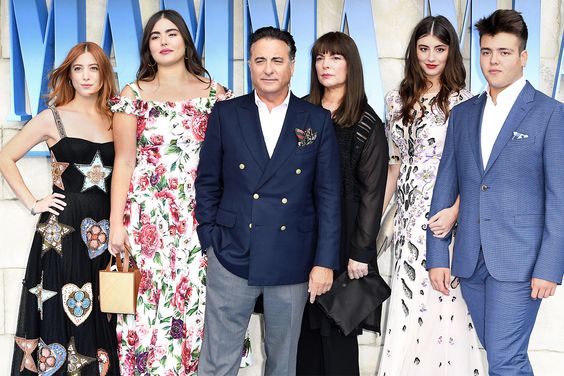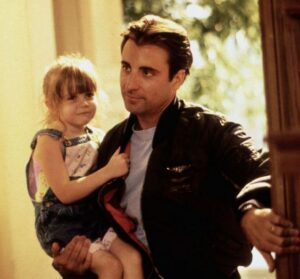
Andy Garcia Is the Father of the Bride in More Ways Than One

The actor, who’s playing the role onscreen and in reality, understands his rigid character: “He’s an amalgamation of everybody I’ve ever known, including myself.”
Andy Garcia still believes in the American promise of prosperity for all. “If you come here and you work hard, there’s a future for you,” he said. “There will always be obstacles, but the opportunity is there.”
In more ways than one, the Cuban-born Garcia, 66, understands the worldview of Billy Herrera, the patriarch he plays in the new Latino-centric take on “Father of the Bride,” streaming on HBO Max. The poignant reinterpretation highlights the generational plight that immigrants and their American-born children face as they try to communicate with one another. The comedy, from the director Gaz Alazraki and the screenwriter Matt Lopez, also manages to avoid depicting Latinos as a monolith.
For his latest lead role, the veteran actor best known for his turns in “The Untouchables,” “The Godfather Part III” and “Ocean’s Eleven,” portrays a proud, self-made Cuban architect whose oldest daughter is about to marry her Mexican sweetheart.
At the same time, Herrera’s wife, Ingrid, played by the singer Gloria Estefan (Garcia’s longtime friend and fellow Cuban exile), announces she wants a divorce, leading Billy to re-examine his inflexible beliefs about masculinity, the work ethic and marriage.
On a recent sunny afternoon at a golf club in the Toluca Lake neighborhood of Los Angeles, Garcia looked appropriately casual chic in a light-blue button-down shirt and beige slacks. Occasionally enhancing his anecdotes with words in Spanish, he spoke about his father’s thoughts on his profession, breaking ground before inclusion was a Hollywood priority, and staying on the entertainment industry “menu.” These are excerpts from our conversation.
It was very difficult for someone with a Hispanic surname because you were never considered. There were exceptions to the rule like Raul Julia, and José Ferrer before him. But for people who weren’t established, it was very hard to be considered for anything other than a Hispanic part. When I started in ’78, there were only about five studios, three networks and PBS; there was no cable. You were typecast and the parts they were writing for Hispanics were predominantly gang members and maids. But they wouldn’t consider me for the gang member roles because I wasn’t physically right: In their minds, gang members were only, in the case of Los Angeles, Chicanos.
I was lucky to begin getting some work because I was a member of an improvisational theater group. Casting directors would see me there, and I would land a little thing here and there. But it was very hard to get it going. It took a long time, from ’78 to ’85, to get a part that was integral to the story. When I got “The Untouchables” (1987), I didn’t have to work as a waiter anymore. Before that I was also doing walla groups, which provide all the incidental dialogue in movies. That was my first post-waiter job. It kept my only child back then in Pampers.
Were your parents encouraging or concerned by your choices?
My father was very concerned about me leaving the family [fragrance] business, which I had worked in all my life and was growing rapidly. As a lawyer by trade and a farmer who worked hard all his life to give his kids opportunities and trained his children to take over the business, it was very difficult for him to see that I was going off in another direction.
Not that he wasn’t supportive, but I know he struggled with concern because there was no understanding of what that industry was. It wasn’t like that with my kids. I have two daughters who are actresses. They grew up in it. They understand the pitfalls.
My father had no concept of the entertainment business or acting. To him, an actor was Humphrey Bogart or Clark Gable. I’m sure in the back of his mind he said, “I love my son, but he’s no Humphrey Bogart.” [Laughs] My mother, on the other hand, was like, “Go and fly. If you break a wing, come back to heal and then decide.” She was more reckless.
There’s a scene in “Father of the Bride” where your character and Gloria’s talk about the difficulty of passing along your native language, Spanish, to your American-born children. Did that dialogue speak to you personally?
Yes. Growing up we spoke Spanish at home, but we also grew up in Miami, where everybody spoke Spanish. My children have had a harder time with it because no matter how much Spanish we spoke, they always favor English because of the environment. They become more Americanized. They can understand and speak it, but they’re not as fluent. If you’re not on top of it every day and practicing it, the language suffers. We as parents are as much at fault for not ingraining it as much as we should have, because we fall into the pattern of speaking English. We could probably be doing this interview in Spanish, but we’re talking in English.
